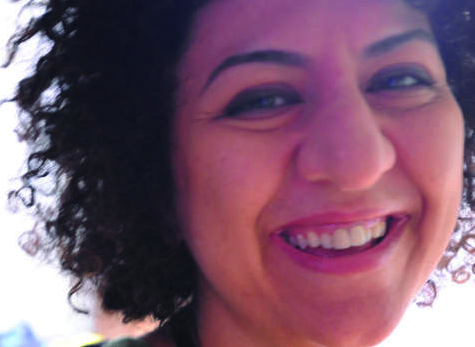The metropolitan Detroit area, where I have lived for over fifteen years, is home to one of the largest Arab-American and African-American populations in the United States. The people of Detroit are very diverse, but it’s definitely a driving city and so we tend to live segregated from each other in the city.
It was when I first moved here from Lansing, MI, a much more racially and economically integrated city an hour and a half away, that I first saw bulletproof glass in gas stations. It was also the first time I had lived in such a densely populated Arab-American enclave. Woo-hoo! I found my people, I thought. Except they were always behind this plexiglass. In every neighborhood, I would encounter Arab men behind glass, their voices muffled and their images distorted. While gas stations provided upward mobility for the Lebanese immigrant community in Detroit, I had to ask myself, “Is this the American Dream?”
I felt that sitting in a gas station for hours on end must actually distort your own perspective of the world, much more than just physically. Then when I discovered that this bulletproof fortress covered with phonecards, bootleg DVDs and fake perfume was referred to as “the cage,” the metaphors and themes began to come together.
I thought about the bulletproof glass and the role it may have been playing in my own life and my perception of the world around me. As a Lebanese immigrant growing up in America, I saw the men in my life enjoy freedoms I did not have. But what is so ironic and inspiring is that, when you actually look at this new emerging Arab-American genre, you will find more women filmmakers than men. I credit this with two things: First, through observing this gas station culture, I was learning more about the environment in which so many Arab men lived, particularly the social and economic pressures they faced. Through close observations within my own family and circle of friends, it always seemed that men were under a great deal of pressure to make money and support their families. And this economic responsibility seemed to trap them in a life they did not dream of or want. Even though Arab women are expected to get an education, a well-paying job and be able to support themselves etc., I think the pressure to become the breadwinner still burdens the Arab man. This was probably the first time in my life that I identified economics, rather then gender, as the real “cage.”
Second, growing up as a girl within an Arab immigrant family was a great training ground in becoming an independent producer! My core philosophy on filmmaking is this: “When making a film, you are already doing the impossible. Therefore, anything is possible.” It’s about suspending our perceived “reality” and going outside of these boundaries in order to move mountains out of your way without destroying the entire path. It’s all about the loopholes. And when you grow up with super-loving but overly protective immigrant parents that never let you leave the house, shave your legs or have a date for prom, then it becomes about finding the loopholes that allow you to live a freer life without necessarily rejecting or destroying your family.
Detroit Unleaded is my debut feature film. I describe it as a slice-of-life romantic dramedy set in a 24-hour gas station in Detroit. The process of making the film from its conception, from making the short “Detroit Unleaded” to writing the feature script, shooting the film, having the world premiere in Toronto, and finally now securing a theatrical release in Detroit and New York has taken 9 years.
Throughout that near-decade, I didn’t know I was a “woman director” until I got a phone call one day from a journalist doing a piece about our premiere at the Toronto International Film Festival. He had really great, thought-provoking questions and interesting commentary on the film. And then he got to the one question that totally shifted my perspective. “So let’s talk about the woman thing,” he said. The woman thing?
“What’s it like being a woman director?” he asked.
I remember reacting with a nervous laugh. I wasn’t offended. It’s a great question that evokes a lot of answers. I just felt tickled to be connecting that dot for the first time. It was an obvious dot to connect, but it somehow didn’t occur to me that this was a relatively unusual thing, to see a woman directing a film. Maybe because directing and producing were always first nature for me, I have been doing this my entire life. Whether it was sneaking out of the house as a teenager or becoming president of my student organization, I was always making things happen so that the impossible became inevitable. I don’t think of this as a female or male trait. It’s more of a testament to our potential as human beings and what can happen when you get together with a group of fiercely talented people and create a movie for all to enjoy for years to come.
Watch the trailer for Detroit Unleaded which opens today in NY:






